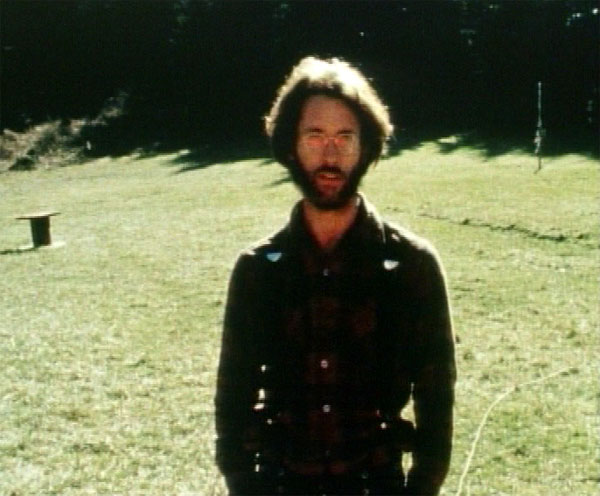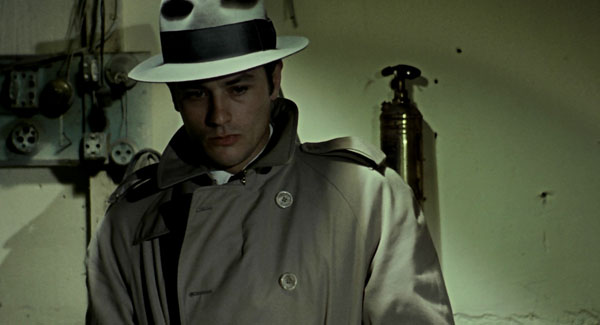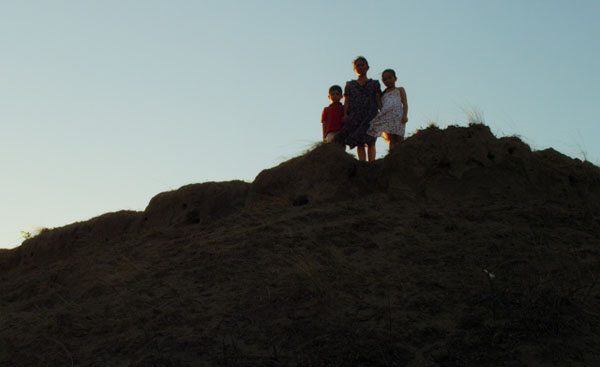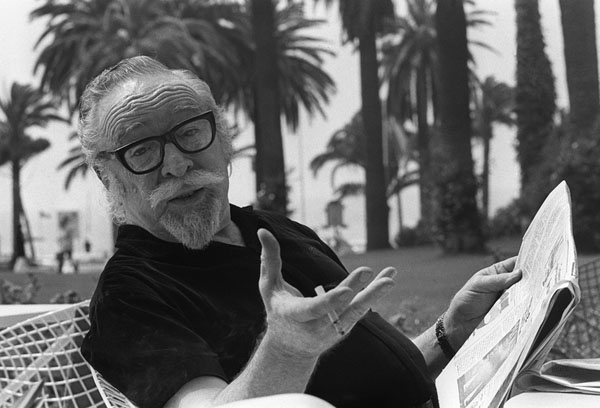Jon Jost‘s Speaking Directly (1973) screens tonight at Third Man Records in Nashville. “Much of the so-called independent cinema of today wouldn’t really be possible without Jost, who spent the 1970s making poetic experimental narratives like Last Chants (for a Slow Dance), Bell Diamond, and Slow Moves,” writes Michael Sicinski for the Scene. “These were films that excavated dominant mythologies, particularly the twin icons of rugged masculinity and the American West, while also finding the time to direct audience attention to the conditions of their making. Actors momentarily slip out of character; a sliver of documentary information disrupts the diegesis; Jost’s own voiceover discusses the filmmaking process, etc. Although none of these films ever made it big, Jost managed to get them seen by enough people around the world to make a name for himself. Prominent international critics considered him a rightful American heir to Jean-Luc Godard.”
Currently, Jost is keeping a diary on his efforts to get his latest film, Coming to Terms, seen—by anyone, anywhere. He’s had some success—it’s premiered in Jeonju—but it’s been an uphill battle: “For the work I do, there is in the present world no ‘market’—to say someone or place which might buy it, in hopes of in turn making some money out of it. No distributor, no television, takes this kind of work anymore—15 or 20 years ago I might have reasonably hoped to sell, if not for much, at least for a little, somewhere. But this is no longer a reasonable expectation.”
The Melville Variations is a video essay (3’24”) and text—the Notebook has the English version, Transit, the Spanish version—by Cristina Álvarez López and Adrian Martin: “13 variations for 13 films, accompanied by the musical theme composed by François de Roubaix for Le samouraï (1967): the cinema of Jean-Pierre Melville condensed into a series of motifs that travel from movie to movie, reiterating and transforming, finding their full meaning only when they are put into relation. A non-exhaustive collection, but filled with recognizable images that clearly obsess this filmmaker.”
Also in the Notebook, Adam Cook looks back on the Toronto International Film Festival—not just the films, but the total experience. This is a personal, moving piece: “Maybe it’s as if we all meet in a place in order to situate our private viewings next to each other’s—there’s still a gap, but it might make a difference, to be closer if still apart.”
And David Cairns reviews E.A. Dupont‘s Varieté (1925), which “led directly to Dupont’s British hits Piccadilly and Moulin Rouge, bloodstained melodramas with a sleazy showbiz background, but this is the prototype.”
In Hollywood and Hitler, 1933-1939, Thomas Doherty “made a passing reference to a radio personality named Alfred Leonard, a member of the Hollywood Anti-Nazi League for the Defense of Democracy,” as Doherty himself notes in the Chiseler. Leonard’s daughter, Eleanor (Leonard) Rubin, recently dropped him an email, offering him a copy of an episode her father’d produced of the radio broadcast Talent in Exile, “a weekly series of anti-Nazi agit-prop showcasing refugee talent.” Doherty was more than happy to accept and now offers a fascinating account, adding that, even after Talent in Exile‘s final episode, “HANL kept up its campaign over the airwaves—due to the generosity and staunch support of Jack and Harry Warner—with anti-Nazi news and entertainment shows throughout the 1930s.”
Also in the Chiseler, from Phoebe Green: “Rudyard Kipling Goes to the Movies.”
Nick Davis and Blake Williams have ranked the films they saw in Toronto and, at Critics Round Up, James Kang has done the math and listed dozens of TIFF 2013 films according to their CRU grades.
Meantime, who’s ranking the critics? Existimatum combines “the satire of the the Onion with the usefulness of Rotten Tomatoes,” according to site founder Peter Kern. Sam Adams reports for Criticwire.
Books. Jonathan Rosenbaum reviews Hollywood’s Chosen People: The Jewish Experience in American Cinema, “a varied collection that tends to get livelier as it proceeds. But considering how slippery and elastic [the editors’] definitions of ‘Jews’ can be, part of their path strikes me as both familiar and questionable.”
The Guardian‘s Emma Brockes talks with Samantha Geimer about her book, The Girl: A Life in the Shadow of Roman Polanski: “Over the decades, she has seen public response to her own story change with the times. ‘You’ll notice the culture has shifted so that everything has swung the other way and now it’s Roman the Monster. And then it was my mum and I the monsters.’ … Polanski should be allowed to resolve his legal issues and come back to the US, she says. ‘Because that’s what would be fair. Because it’s the right thing.’ And her? She smiles. ‘I’m fine.'” Again, earlier: David Ehrenstein.
Seattle. The Stranger‘s David Schmader: “Into a world of film festivals that are crapshoots of quality comes Cinerama’s Big Screen 70MM Film Festival, which is packed with nothing but beloved classics, all shown in 70 mm on Cinerama’s state-of-the-art screen.” Through September 29.
In the works. “Bryan Cranston is set to star in the indie Trumbo, based on the true-life story of blacklisted scribe Dalton Trumbo,” reports Variety‘s Justin Kroll. Jay Roach will direct.
Phaidon sketches a little background to Mary McGuckian’s forthcoming The Price of Desire with Vincent Perez as Le Corbusier, Orla Brady as the architect Eileen Gray, and Alanis Morissette is Gray’s lover, the French singer Marie-Louise Damien, better known as Damia.
For news and tips throughout the day every day, follow @KeyframeDaily on Twitter and/or the RSS feed. Get Keyframe Daily in your inbox by signing in at fandor.com/daily.







